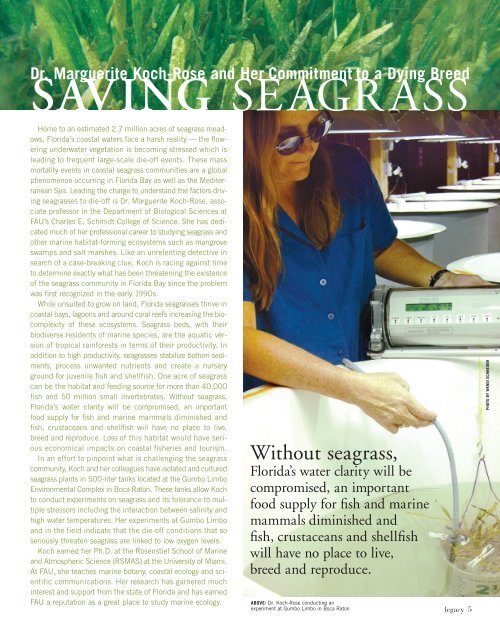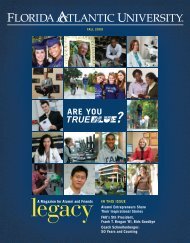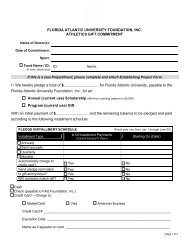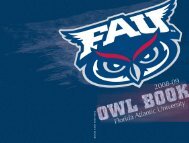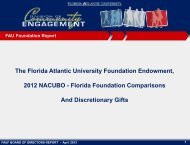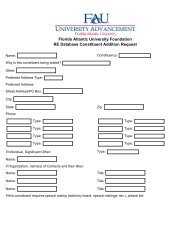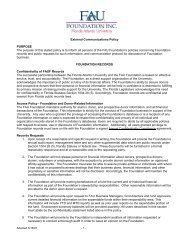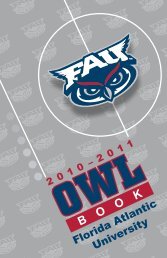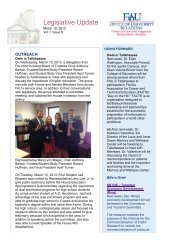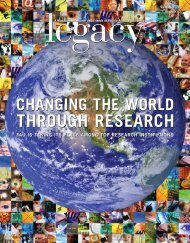Download this publication as PDF - FAU Foundation, Inc. - Florida ...
Download this publication as PDF - FAU Foundation, Inc. - Florida ...
Download this publication as PDF - FAU Foundation, Inc. - Florida ...
Create successful ePaper yourself
Turn your PDF publications into a flip-book with our unique Google optimized e-Paper software.
Dr. Marguerite Koch-Rose and Her Commitment to a Dying Breed<br />
SAVING SEAGR ASS<br />
Home to an estimated 2.7 million acres of seagr<strong>as</strong>s meadows,<br />
<strong>Florida</strong>’s co<strong>as</strong>tal waters face a harsh reality — the flowering<br />
underwater vegetation is becoming stressed which is<br />
leading to frequent large-scale die-off events. These m<strong>as</strong>s<br />
mortality events in co<strong>as</strong>tal seagr<strong>as</strong>s communities are a global<br />
phenomenon occurring in <strong>Florida</strong> Bay <strong>as</strong> well <strong>as</strong> the Mediterranean<br />
Sea. Leading the charge to understand the factors driving<br />
seagr<strong>as</strong>ses to die-off is Dr. Marguerite Koch-Rose, <strong>as</strong>sociate<br />
professor in the Department of Biological Sciences at<br />
<strong>FAU</strong>’s Charles E. Schmidt College of Science. She h<strong>as</strong> dedicated<br />
much of her professional career to studying seagr<strong>as</strong>s and<br />
other marine habitat-forming ecosystems such <strong>as</strong> mangrove<br />
swamps and salt marshes. Like an unrelenting detective in<br />
search of a c<strong>as</strong>e-breaking clue, Koch is racing against time<br />
to determine exactly what h<strong>as</strong> been threatening the existence<br />
of the seagr<strong>as</strong>s community in <strong>Florida</strong> Bay since the problem<br />
w<strong>as</strong> first recognized in the early 1990s.<br />
While unsuited to grow on land, <strong>Florida</strong> seagr<strong>as</strong>ses thrive in<br />
co<strong>as</strong>tal bays, lagoons and around coral reefs incre<strong>as</strong>ing the biocomplexity<br />
of these ecosystems. Seagr<strong>as</strong>s beds, with their<br />
biodiverse residents of marine species, are the aquatic version<br />
of tropical rainforests in terms of their productivity. In<br />
addition to high productivity, seagr<strong>as</strong>ses stabilize bottom sediments,<br />
process unwanted nutrients and create a nursery<br />
ground for juvenile fish and shellfish. One acre of seagr<strong>as</strong>s<br />
can be the habitat and feeding source for more than 40,000<br />
fish and 50 million small invertebrates. Without seagr<strong>as</strong>s,<br />
<strong>Florida</strong>’s water clarity will be compromised, an important<br />
food supply for fish and marine mammals diminished and<br />
fish, crustaceans and shellfish will have no place to live,<br />
breed and reproduce. Loss of <strong>this</strong> habitat would have serious<br />
economical impacts on co<strong>as</strong>tal fisheries and tourism.<br />
In an effort to pinpoint what is challenging the seagr<strong>as</strong>s<br />
community, Koch and her colleagues have isolated and cultured<br />
seagr<strong>as</strong>s plants in 500-liter tanks located at the Gumbo Limbo<br />
Environmental Complex in Boca Raton. These tanks allow Koch<br />
to conduct experiments on seagr<strong>as</strong>s and its tolerance to multiple<br />
stressors including the interaction between salinity and<br />
high water temperatures. Her experiments at Gumbo Limbo<br />
and in the field indicate that the die-off conditions that so<br />
seriously threaten seagr<strong>as</strong>s are linked to low oxygen levels.<br />
Koch earned her Ph.D. at the Rosenstiel School of Marine<br />
and Atmospheric Science (RSMAS) at the University of Miami.<br />
At <strong>FAU</strong>, she teaches marine botany, co<strong>as</strong>tal ecology and scientific<br />
communications. Her research h<strong>as</strong> garnered much<br />
interest and support from the state of <strong>Florida</strong> and h<strong>as</strong> earned<br />
<strong>FAU</strong> a reputation <strong>as</strong> a great place to study marine ecology.<br />
Without seagr<strong>as</strong>s,<br />
<strong>Florida</strong>’s water clarity will be<br />
compromised, an important<br />
food supply for fish and marine<br />
mammals diminished and<br />
fish, crustaceans and shellfish<br />
will have no place to live,<br />
breed and reproduce.<br />
ABOVE: Dr. Koch-Rose conducting an<br />
experiment at Gumbo Limbo in Boca Raton<br />
legacy 5<br />
PHOTO BY WENDI SCHNEIDER


